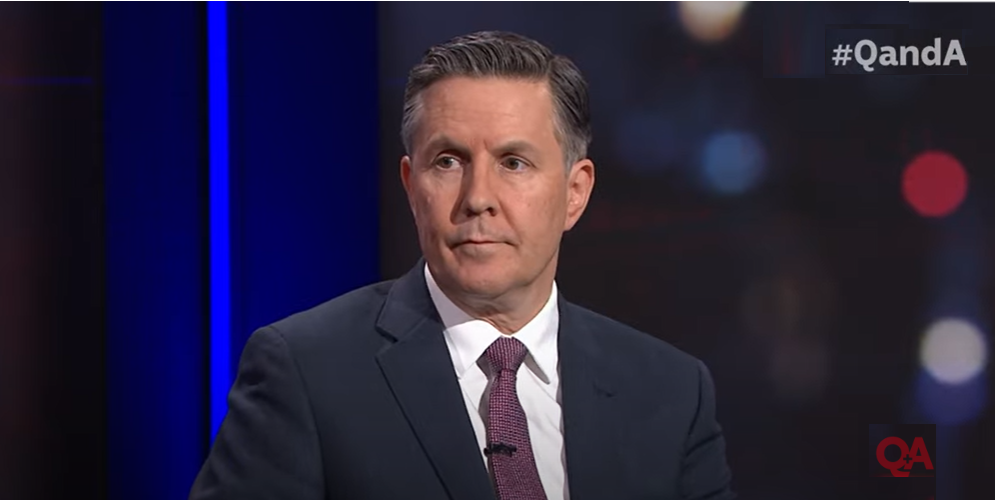
Butler’s vaping policy is a missed public health opportunity
Posted on November 7, 2023 By Colin
DURING LAST NIGHT'S Q+A PROGRAM, Health Minister Mark Butler highlighted legitimate concerns about youth vaping. However his proposed solutions could undermine public health and miss the chance to leverage vaping as a cessation tool for adult smokers. Video here.
The crux of the issue is Australia's flawed vaping regulation. The current regulations have created a thriving black market which make vapes readily accessible for young people.
The prescription-only model for vaping has been opposed by healthcare professionals and rejected by the public. It has created a booming black market, complete with violence and criminal activity, and a proliferation of substandard, unregulated products sold to minors.
Minister Butler's plan to halt the import of these products will involve exorbitant enforcement and policing costs, with dubious effectiveness. History has shown that prohibition (including de facto prohibition) — whether of alcohol or drugs — does not stem availability; it simply fuels illicit trade.
As Patricia Karvelas noted, cocaine is banned but is freely available, as are a wide range of other illicit products. If people want a drug, criminal networks will find a way of making it available.
A more pragmatic regulatory framework would treat vapes as adult-only items, sold through licensed retail outlets with stringent age checks, similar to tobacco and alcohol. Such a system, with severe penalties for violations, has been successful in other countries like New Zealand, the UK, the US, and Canada.
Older smokers forgotten
A glaring oversight in Australia’s policy is its failure to serve older smokers, a demographic shown by the 2019 National Drug Strategy Household Survey to have stalled in quitting rates. For these individuals, vaping could be a life-saving alternative, yet misinformation and the prescription model's complexities deter them from the legal pathways.
This policy neglects an entire generation of smokers, risking lives that could have been saved — a true public health tragedy. Minister Butler should focus on education and support to encourage vaping as a safer substitute for those adult smokers unable to quit via traditional means, emulating the stance of governments in New Zealand and the UK. Easier access to legal vaping products for adults could avert a public health tragedy.
Keep youth vaping in perspective
The potential harm to young vapers should be kept in perspective. Youth vaping, especially among non-smokers, tends to be experimental and short-lived. Vaping is not without risk, but vapour contains far fewer toxicants than smoke and health consequences are rare.
Despite claims, there is insufficient evidence linking youth vaping to significant respiratory issues, the onset of asthma, seizures, pneumothorax, or adolescent brain harm. Nicotine dependence among non-smoking youth remains rare.
Minister Butler stated that youth smoking is rising in Australia, but it is highly unlikely that vaping is the cause. Youth smoking rates are declining in other nations with similar vaping prevalence, down to figures as low as 1.1% in the U.S., 2% in Canada, and 3% in both New Zealand and England, suggesting alternative regulatory methods could be more effective.
Moreover, vaping is not a "gateway" to smoking as Mr Butler claims. Evidence indicates that it is diverting youth from smoking on a broader scale.
Moreover, vaping trends among teens may be more ephemeral than previously thought. For instance, in the U.S., high school vaping has plummeted by 64% from its peak in 2019. Similarly, there was a 20% decline in Canada from 2019-2022 and possible stabilisation in New Zealand.
The Big Tobacco furphy
Skepticism towards the industry is warranted given its history. Nonetheless, attributing youth vaping in Australia to these companies is inaccurate, as the black market is dominated by products illegally imported from China, not by tobacco companies.
We must do better
Minister Butler’s concern for the welfare of Australia's youth is shared by many. However, it is critical to strike a balance that protects young Australians from potential harms while recognising the potential of vaping as a harm reduction tool for their parents and grandparents.
By learning from the successful policies of other countries, Australia can craft a more effective strategy. This would not only combat the illegal vape market but also offer a lifeline to older smokers, turning a public health challenge into an huge opportunity.
Go to Top